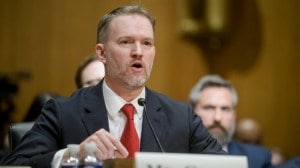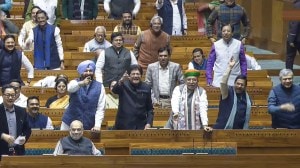‘Seize the moment’
We are writing to urge you to pass, as quickly as possible, the Congressional resolution of approval that will permit final implementation of the US-India agreement on civil nuclear...

We are writing to urge you to pass, as quickly as possible, the Congressional resolution of approval that will permit final implementation of the US-India agreement on civil nuclear cooperation (“123 Agreement”) that President Bush has sent to Congress. Allthe signatories of this letter are long-time South Asia specialists; many of them have held senior positions in the US government in the past.
No issue is more vital to the future of the US-India partnership than this legislation. The Henry J. Hyde United States-India Peaceful Atomic Energy Cooperation Act of 2006 passed both houses of Congress with large bipartisan majorities and was signed into law by President Bush on December 18, 2006. In 2007, we negotiated the bilateral cooperation agreement. In July 2008, the Indian government put its existence on the line and obtained parliamentary support for the agreement. The International Atomic Energy Agency (IAEA) and the Nuclear Suppliers’ Group have taken the steps needed to implement the agreement, fulfilling the conditions stipulated in the Atomic Energy Act of 1954 and the Hyde Act.
India, like us, faces national elections soon — no later than May 2009. Now that the hard work of negotiating has been done, both bilaterally and internationally, it is essential to seize the moment and pass the implementing legislation. A failure by Congress to take the final action implementing this agreement would be a severe setback to the strategic gains both the US and India hope to gain from their partnership. It would also put US industry at a deep disadvantage, now that other states can freely participate in civil nuclear cooperation with India.
Common strategic interests: In proposing the agreement, the Bush administration stressed three factors: the geo-strategic significance of our emerging relationship with India; India’s excellent record in safeguarding nuclear technology; and India’s massive future energy needs. All three arguments are as powerful as ever. With its growing economy and powerful military position, India has become a global partner for the United States and is shaping the future of Asia. There is a striking convergence of interests between India and the US on issues vital to us. India has taken a strong stand against international terrorism. It is one of the largest economic contributors to reconstruction in Afghanistan. It is the primary resident naval force in the Indian Ocean, and works with us to maintain the security of the sea-lanes through which most of the worlds oil trade travels. These common interests provide a solid foundation for a long-term partnership based on both democratic values and geopolitical interests. A strong relationship with India is critical to US security and economic interests in Asia.
India’s nonproliferation record: When the Congress passed the Hyde Act, it recognized India’s steadfast refusal to transfer nuclear technology to others. These unique circumstances make this change in US nonproliferation policy possible. We are now poised to reap the nonproliferation benefits of ending India’s nuclear isolation. Eligibility for civilian nuclear cooperation is an essential first step toward bringing India fully into the global effort to prevent onward transmission of nuclear weapons knowhow. India’s formal statement to the NSG on September 5 reiterates India’s commitment to a voluntary, unilateral moratorium on nuclear testing. It pledges to strengthen the international nonproliferation regime, and undertakes to work toward a multilateral Fissile Material Cutoff Treaty. Implementing this agreement will give new energy to these critical nonproliferation efforts.
Energy and the environment: India’s energy demand is expected to grow 4.6 per cent per year for the next two decades. The whole world has an interest helping India deal with this relentless expansion. Nuclear energy currently makes up only about 3 per cent of India’s overall power supply. But with an economy growing at 7-9 per cent per year, every potential source of power is crucial. India has ambitious plans to expand civil nuclear power. Every nuclear power plant it introduces will take some pressure off the financial and environmental costs of conventional generation. We need this agreement, for our sake and for the sake of the planet.
Prime Minister Manmohan Singh bet his government on this agreement, and won a vote of confidence on July 22. The government’s communist allies opposed the implied strategic relationship with the US. Their view lost, and when they tried to bring down the government, they failed. On India’s political spectrum, everyone except the leftist parties, which represent about 12 per cent of the seats in parliament, supports a strong relationship with the United States. This does not mean that partnership with India will always work seamlessly. Like any two large countries with diverse interests, we have our disagreements, and India has a strong commitment to maintaining independence — and the appearance of independence — in its foreign policy. But India’s basic hopes for the future are in line with ours. It is this convergence of interests that will strengthen our future partnership.
Now that the IAEA and the NSG have acted, we urge you to move ahead. The negotiations that produced the agreement were long and complex, and both sides have accepted provisions they might have preferred to write differently. In light of the long and difficult negotiations, we would respectfully ask that no further attempts be made to change the substance of the agreement. The benefit of forging a real strategic partnership with India is huge, and if we move ahead now, we should be able to strengthen global cooperation against onward proliferation of nuclear weapons. This is the time to move forward, decisively and fast.
This agreement is too important to be defeated by letting the clock run out.
Sincerely yours,
• WALTER ANDERSEN
Associate Director, South Asia Studies
School of Advanced International Studies
Johns Hopkins University
• MARSHALL BOUTON
President, Chicago Council on
Global Affairs
• RICHARD CELESTE
Former US Ambassador to India
• STEPHEN P. COHEN
Senior Fellow, Foreign Policy Studies
The Brookings Institution
• AINSLEE EMBREE
Professor Emeritus of History
Columbia University
• SELIG HARRISON
Director, Asia Program
Center for International Policy
• ROBERT M. HATHAWAY
Director, Asia Program, Woodrow Wilson International Center for Scholars
• KARL F. INDERFURTH
Director, International Affairs
Program Elliott School of International Affairs George Washington University
• ROBERT KAGAN
Senior Associate, Carnegie Endowment for International Peace
• DENNIS KUX
Senior Policy Scholar, Woodrow Wilson Center
• JOHN B. RITCH
Director General, World Nuclear Association
• LLOYD RUDOLPH
Professor of Political Science Emeritus
University of Chicago
• TERESITA C.SCHAFFER
Director, South Asia Program, Center for Strategic and International Studies
• ASHLEY J. TELLIS
Senior Associate, Carnegie Endowment for International Peace
• FRANK WISNER
Former US Ambassador to India
• HAROLD GOULD
Visiting Scholar, Center for South Asian Studies, University of Virginia
• DANIEL MARKEY
Senior Fellow, Council on Foreign Relations
• THOMAS R. PICKERING
Former US Ambassador to India
• SUSANNE RUDOLPH
Professor of Political Science Emerita
University of Chicago
• HOWARD B. SCHAFFER
Former Deputy Assistant Secretary of State for Near Eastern and South Asian Affairs
• RAY VICKERY
Stonebridge International
Former Assistant Secretary, Department of
Commerce
- 01
- 02
- 03
- 04
- 05































